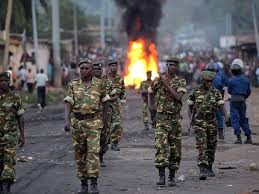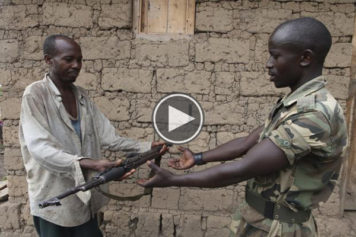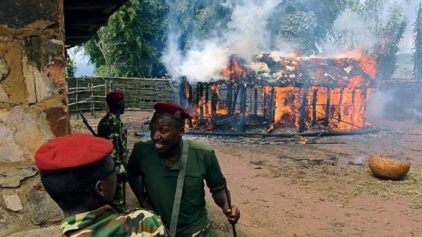As a region, East Africa has one of the fastest-growing economies in the developing world. Rwanda is rated as having one of the best investment environments in sub-Saharan Africa and the developing world; Kenya attracts the largest foreign direct investment (FDI) in sub-Saharan Africa, and Tanzania has numerous mega projects involving the expansion of the port in Dar es Salaam and Mtwara, along with major potential in the hydrocarbons sector.
Uganda’s economy has improved and the country’s recent gas finds have spurred investment within this sector of the economy. And Somalia, with its over 20 years of war, is slowly turning the corner and emerging into a functional state.
If one were to include Ethiopia into this collection of nations, it can be said they all represent the future of Africa as an emerging frontier market for growth and development.
However, the economic and societal gains made over the past years will be ripped to shreds if the current crisis in Burundi spills out of control. But what makes Burundi so important?
Burundi is a small nation with a population of 11 million people. It is recognized as one of the five poorest nations in the world, and although it has some mineral resources, it pales in comparison to its neighbors. However, its importance lies in it being at the nexus of a region that historically has seen numerous wars and massacres, due to the Hutu and Tutsi conflict, but has been relatively peaceful for the past eight years.
As it stands, Burundi is facing an enormous political and social crisis that threatens to split the country apart and plunge the nation and quite possibly the region back into a bloody and prolonged war. At the center of this conflict is President Pierre Nkurunziza, a Hutu, and the political conflict resulting from his decision to run for a third term as president. The issue is highly inflammatory as many people in the opposition camp and even some of his supporters note that the law states the president is only allowed to serve two terms. The fact that this law was signed into power to end the previous civil war and hence, designed to prevent any one person from becoming a dictator, makes the matter all the more contentious.
Protesters have been in the streets for months and in April, while Nkurunziza was in Tanzania for an emergency session with regional leaders, a coup was launched to displace him. The coup ultimately failed with his leaders captured, some imprisoned and some killed. This led to the dissolution of the country’s election board and to thousands of people fleeing the country.
As it stands today, elections are to be held in mid July, and while it appears that Nkurunziza will easily win, the results will be highly disputed and not recognized by other African nations.
At the current pace, the domino effect will undue the economic and development gains made by other nations in the region. To start off, the most effected nation will surely be Rwanda. While the country has a shared history with Burundi due to its own civil war, routine conflicts and massacres involving the Hutu-Tutsi rivalry, Rwanda has in fact been one of brightest lights for its economic and social recovery in the world.
Paul Kagame, an ethnic Tutsi, has been recognized as one of the best leaders in the region for his ability to see the bigger picture and create an atmosphere of healing in the place of resentment. With his presidential tenure coming to an end and there being rumors that he may seek another term, many are divided as how to support such a path. While some would argue that due to his political acumen and ability to navigate the tribal issues that have plagued the region, it wouldn’t be such a bad idea for him to remain as the nation’s guiding hand.
However, the dynamics of his position would change dramatically if neighboring Burundi, led by a Hutu, erupts in open bloodshed. Should the conflict in Burundi continue to worsen and the inevitable atrocities occur against the minority Tutsi, Kagame would be forced to act.
With the region already home to millions of refugees from previous conflicts and populations spread across Tanzania, Southern Uganda, the Democratic Republic of Congo (DRC) and within Rwanda itself, the situation would create enormous turmoil.
Tanzania would immediately be affected because of its shared border with Burundi and its relative stability. Hundreds of thousands of people would continue to pour over the border into areas that are already stressed of resources and services.
Uganda and the eastern region of the DRC would be affected because they both play host to large populations of Hutu and Tutsi people, many of whom carry the ethnic rivalries across borders and routinely attack one another. Thus a greater conflict would force the governments of regional nations to act, which in the past, were major aspects of the Second Great Congo War.
Although conflict is not new to this region of Africa, the biggest differences now are the enhanced economic and development ties that have been made in the past few years. The East Africa Community involves all of these nations (Kenya, Uganda, Burundi, Tanzania, Rwanda) along with South Sudan and Somalia who have also applied for membership.
Major development projects such as the ports in Tanzania are designed based upon the notion that there will not be a war in the region, which will displace millions of people, particularly in the area of the mineral rich Eastern DRC and Rwanda.
Kenya and Ethiopia have also expanded their airports, hoping to tap into the emerging markets of the region with the hopes of providing access to international businesses seeking investment opportunities.
The multibillion dollar LAPSSET project (Lamu Port-South Sudan-Ethiopia) and the major railway projects in Kenya and Tanzania would ultimately be affected because one of the main functions of these projects is to provide the landlocked, yet mineral-rich countries of Uganda, Rwanda, Burundi and the DRC access to ports. However, if there is a war raging in the region, it’s safe to say business and investment will be affected. Thus to this extent, the nations may face a debt issue because of their inability to pay back loans.
One might point to the current conflict in South Sudan and suggest that the situation in Burundi will not have a large impact on the surrounding economies, but this would be inaccurate.
For one, South Sudan’s conflict is largely internal and has very little spillover effect. The conflict is indeed a disaster and has hampered the development of Kenya’s Lamu Port, but ultimately other nations will likely not witness any bloodshed because the nature of the conflict involves tribes totally indigenous to South Sudan.
As mentioned earlier, the tribal issue in Burundi crosses the boundaries of at least five nations and has been ongoing for over a century. Point blank, this is a powder keg that threatens to explode in the region.
To reiterate this scenario: Burundi erupts into conflict. Rwanda becomes involved. Rwanda’s internal issues become exacerbated and historical tribal issues come to the forefront in both nations. Tanzania becomes involved because it will likely have to unwillingly host most of the refugees. The DRC and Uganda become involved because both nations host large groups related to the hostilities, and in the past, those groups have committed atrocities against one another in their countries.
At the end of the day, no one wins. The African rising narrative that has become prominent in the past few years reverts back to the same dark continent people were accustomed to as millions of people die of violence and starvation. And one big difference now is that European nations and non-governmental organizations will not be able to lend a big helping hand as before.
The issues involving the International Criminal Court (ICC) have made European bodies wary of being involved in such conflicts. In addition, the financial woes currently facing the European Union and European countries mean their attention will be more with solving the problems at home.
As it stands, if something is not done soon, we will be witnessing a dark era in Africa. In fact, we will be re-witnessing a dark era because this has happened before numerous times.
I don’t know if the answer is to give Nkurunziza a brief case with a few million dollars and safe passage to another country to live out his life. Or maybe regional countries will pressure him and the opposition to sit at the table and reach a settlement or face a heavy blockade.
Whatever the solution, something must be done. If not, there is one guarantee.
No one wins.
Jamal Bradley is an American businessman and writer from Philadelphia who is currently based in Kenya.



